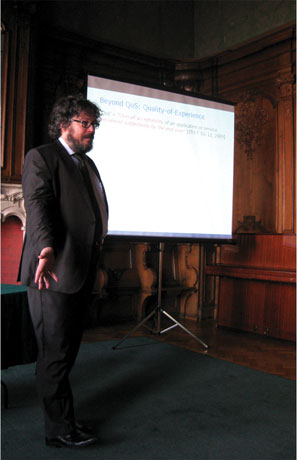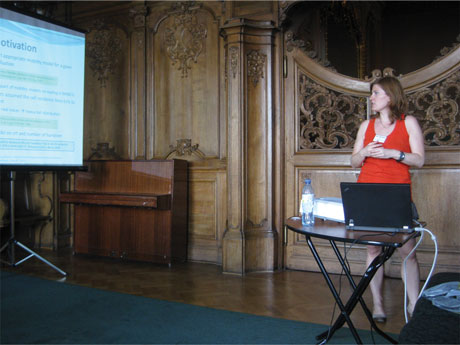by Desislava Dimitrova and Torsten Braun
The 7th ERCIM Workshop on eMobility, held for the second time together with the MobiSense workshop, took place on 4 June 2013, in St Petersburg, Russia. The workshop venue was the former imperial palace with its fantastic decor and view to the Neva River, which set a special atmosphere for the participants. Like previous editions the workshop was co-located with the 11th edition of the International Conference on Wired/Wireless Internet Communications (WWIC 2013) and was co-funded by ERCIM. The workshop targets research related to the impact of user and device mobility on multiple technical areas in communications such as network architecture, communication protocols and algorithm performance but also on more user-oriented areas such as application development and quality of service/experience. The workshop focused on two major research topics, namely, localization and communication solutions for wireless sensor networks.

The joint workshop included a keynote talk and two technical sessions of peer reviewed and invited papers. The invited talk, given by Prof. Peter Reichl from Telecom Bretagne, addressed less technical but nevertheless highly important research for the development of wireless systems. Prof. Reichl discussed how the relationship between system performance parameters and user satisfaction can be correctly represented by mathematical models. He supported his presentation with an analysis of studies that investigated user satisfaction of a content delivery system.

The first technical section on “Localization” included four papers addressing issues in the area of indoor localization covering a diversity of approaches from dead reckoning to algorithms based on WiFi and cellular signals. In particular, Kun-chan Lan (National Cheng Kung University, Taiwan) discussed filtering schemes that can be applied to improve the localization estimate obtained from motion sensors in personal mobile devices. Dr. Enrica Zola (Polytechnic University of Catalonia, Spain) presented two papers from her Telematics group. The first presentation focused on time-based localization approaches with WiFi signals that can offer feedback on human mobility patterns, while the second talk discussed the importance of such mobility patterns for handovers in cellular networks. Finally, Dr. Desislava Dimitrova (University of Bern, Switzerland) gave an overview of the challenges arising in localization systems with passive signal overhearing, comparing the cases of WiFi and cellular (GSM) signals.
The second technical session on “Wireless Sensor Networks” addressed a broader set of topics related to communication between devices with often limited power supply. For instance, Prof. Jorge Granjal (University of Coimbra, Portugal) discussed the critical topics of security support for wireless sensor networks (WSN) and, in particular, how the challenge of performing energy-heavy authentication and encryption computations with energy-limited sensor nodes can be resolved. He then presented the work of a PhD student, who is proposing a novel middleware that can support machine-to-machine (M2M) communications. The second part of the session included work on a novel energy-efficient MAC Protocol for WSNs by Sarwar Morshed (University of Twente, The Netherlands) and a presentation of the Mobility2.0 project by Dr. Geert Heijenk (University of Twente, The Netherlands). Mobility 2.0 is an EU FP7 project in the framework of “ICT for Green Cars-2012” and targets the development of commuting applications for electrical vehicles taking into account the specific requirements of the end users but also of the vehicle.
The event was accompanied by a social event, which was held in the city of St Petersburg allowing the participants to get familiar not only with the city but also with typical Russian cuisine. We are grateful to the local organizers, under the guidance of Prof. Yevgeni Koucheryavy (Tampere University of Technology, Finland) for their excellent work.
The workshop proceedings (ISBN: 978-3-9522719-4-0) can be downloaded in pdf from the workshop website, where all presentations can also be found, following the corresponding program entry.
Link:
Workshop website:
http://wiki.ercim.eu/wg/eMobility/index.php/Second_Joint_ERCIM_eMobility_and_MobiSense_Workshop
Please contact:
Torsten Braun, E-mobility Working Group chair
University of Bern, Switzerland
E-mail:










